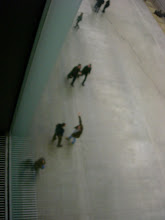
“It’d be fucking wicked yeah, if people think they can play out meaning!”
Academic literature has lately been feeding greedily on ‘informal studies’ based on insiders’ participation and spontaneous writings. Is it the comeback of the armchair Anthropologist? Or could it be the upheaval of popular ethnography?
Our undercover reporter for undercover party journalism met one of the field's goofiest professionals, MR Dean Ashford.
Dean got up in the morning, a thick but ugly slime of white make-up on his face, thinking his job was over. He was suddenly illuminated by his projection on the mirror, new prospects surging into the frame.
The previous night had been a tough challenge, spent in a flesh-spot disguised as a snowman (with a good bunch of hair). He had finally found the funding for his Research project in ‘free ethno-performance’. Without letting slip of the supporting institution’s name, who forbad him to use them as a marketing brand, we sat down in the living room of his Shoreditch flat with his photographer, George, to analyze the shots of this successful fieldwork.
In the first ten, Mr Dean seemed to my eyes desperately aiming for the girls at the bar but obviously prevented in doing so by a big tough eastern-european fellow. ‘Me & Krysztóf at the bar’ was the title of the series. Krysztóf Dotsujivne works for security and was told to keep an eye on Mr. Dean for the night, which deeply affected the content of the images. In one of them though, George got a nice contrast with what looks like a mountain harbouring over a queer snowman with a sweet half-naked background. Dean considers he can make good use of the material:
“It’s like snow innit, womens.
Strolling down the branch, dripping all over the ground yeah, melting in you ‘air and the earth, too yeah. It recycles itself, beautiful innit?”
And while I was enjoying this poetic vision of the cycle of life, George was showing me a raving snowman with red eyes and crazy fumbled hair (now with a golden wig) jumping over an eastern European mountain (is it the Carpathian chain?) on a terrified young dancer. More poetry…
“It’s like, my goal yeah is like to achieve kind of that kind of stuff that’s not done yet, know what I mean? Performance, yeah, that’s not just a total new style, you know. It’s like… people all put the same suit in the fxxxing wardrobe every night, know what I mean?!?”
Acting directly from, for and within context, the Agenda of an Anthropology of performance at Risk (certainly with Dean it is) submits itself to law, discourse, ritual and categorizing, also keen on the performance of surrealism, the enactment of a world of dreams, symbols as in trance-rituals.
George lights up a spliff, opens the window, and decides to shut it again.
“You know like in Media yeah, everything’s kinda written in the third person. People like it, I reckon, but like… My aim is to bring respect into performance. It’d be fucking wicked yeah, if people think they can play out meaning!”
Anthropology of Performance at risk’ was created by a frustrated Norwegian artist, Jack Gak, who stated he wanted to gather under the same umbrella “hedonistic concepts of creation in a frustrating liberal sphere of stuffed minds and floorless dreams and action-theatrical approach to ethnography via the staging of ritual in public spheres of ecstasy”. This was back in 1987, at a time of uncertainty in global terms when the Cold War was at its most delicate point.
“Oh, Jack yeah, he’s right up the road he is; got a gallery now, a wife and three daughters, life’s alright, I guess”.
Asked about the man’s influence, Dean turns a cynical grey face: “Well, you know, I’d say he’s a bit old-school kinda guy, like… his theories on post-marital rituals are so gender-biased, know what I mean! But I mean I got respect for the guy, he motivated a whole bunch of people to get out there and do the writing. ‘E just missed a point ‘ere; people realise you can take it a step further into the home, like – forget Durkheim, mate, it’s like, you got to start with yourself!”
George shows me another snap, while Dean stretches and amazes us with some of his ‘contemporary-Morris dancing’. On the picture, this time, it seems like Dean is having a hard time dealing with the effects of binge-dancing, head deep in the toilet cubicle. The picture is an intense green contrasting with a strange shadowy style. Dean comments on this unaffected “Aah, now see here I am at the last state of fieldwork verification – it takes a lot of experience to lead such investigation, you get me?”
“Oh I love this one!” says George.
He shows a big black & white close-up of George and Dean’s flashed faces in what seems to be the women’s toilet.
“Not much point innit! But see that’s what I mean when I say it’s a risk, yeah, at the risk of loosing all norms, codes, or using those ones which we don’t attach no meaning to. That’s why I believe George’s an amazing photographer, man”.
I leave their flat with a copy of the early morning shot of Dean. Ain’t no bullet…
Before I left, Dean Ashford – no diploma, no bibliography – confessed he had come to realise this morning his next project must involve employment at KFC, so he could apply such methods (“at risk!”) in a realist context…
A deep breath… Human is a conceptual wonder.
As I’m walking down Whitechapel road and people have finished putting up their stalls, it’s already midday and market-time: time for others to intervene on the field.
D.W.James,
Undercover party journalist
for
the U.P.J.
UJP leaves space for all comments
Should this type of fieldwork get state-funding?
www.anthropologyofperformanceatrisk.com/DeanandGeorge/funding_forum

